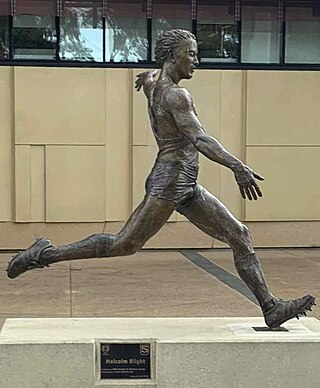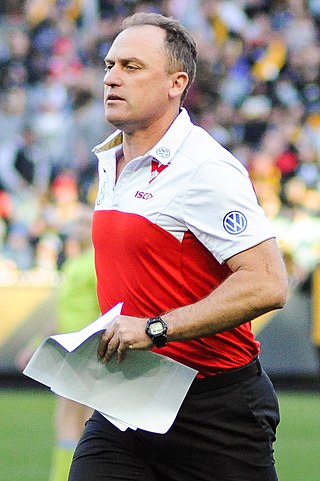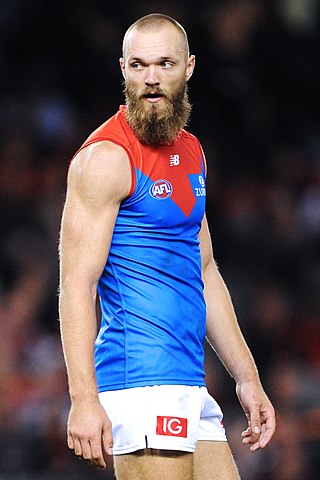Related Research Articles

Malcolm Jack Blight AM is a former Australian rules footballer who played for and coached the North Melbourne Football Club in the Victorian Football League (VFL) and Woodville Football Club in the South Australian National Football League (SANFL). He also coached the Geelong Football Club, Adelaide Football Club and St Kilda Football Club.

The 1899 VFL season was the third season of the Victorian Football League (VFL), the highest level senior Australian rules football competition in Victoria. The season featured eight clubs, ran from 13 May until 16 September, and comprised a 14-game home-and-away season followed by a finals series featuring all eight clubs.

John Longmire is the current coach of the Sydney Swans in the Australian Football League (AFL) since 2010, and is the longest serving active AFL coach. As a player, he represented the North Melbourne Football Club in the Australian Football League (AFL) from 1988 to 1999.
In Australian rules football, the followers are the players in the following three positions: ruckman, ruck-rover, and rover. These three players are known as followers because they have traditionally been used as players that follow the ball all around the ground, as opposed to playing in a set position. In recent years, there has been a decreased emphasis on set positions in Australian football. Followers still cover more ground than any other player on the field.
Paul Salmon is a former Australian rules footballer who played in the Australian Football League for Essendon and Hawthorn. Recruited from North Ringwood, Salmon had a prolific career, with many accolades such as being inducted into the Australian Football Hall of Fame, a two-time premiership player, seven-time leading goalkicker at Essendon, and the fourth-highest goalkicker for Essendon.

Leslie Roy Foote was an Australian rules footballer in the Victorian Football League.

Michael Strickland Gardiner is a former Australian rules footballer who played for the St Kilda Football Club and the West Coast Eagles in the Australian Football League (AFL). Originally from Albany, Western Australia.
The 1996 AFL season was the 100th season of the Australian Football League (AFL), the highest level senior Australian rules football competition in Australia, which was known as the Victorian Football League until 1989. The season featured sixteen clubs and ran from 29 March until 28 September. It comprised a 22-game home-and-away season followed by a finals series featuring the top eight clubs, as well as several celebrations of the league's centenary.
The 1961 VFL season was the 65th season of the Victorian Football League (VFL), the highest level senior Australian rules football competition in Victoria. The season featured twelve clubs, ran from 15 April until 23 September, and comprised an 18-game home-and-away season followed by a finals series featuring the top four clubs.
The 1947 VFL season was the 51st season of the Victorian Football League (VFL), the highest level senior Australian rules football competition in Victoria. The season featured twelve clubs, ran from 19 April until 27 September, and comprised a 19-game home-and-away season followed by a finals series featuring the top four clubs.
The 1971 VFL season was the 75th season of the Victorian Football League (VFL), the highest level senior Australian rules football competition in Victoria. The season featured twelve clubs, ran from 3 April until 25 September, and comprised a 22-game home-and-away season followed by a finals series featuring the top four clubs.
The 1972 VFL season was the 76th season of the Victorian Football League (VFL), the highest level senior Australian rules football competition in Victoria. The season featured twelve clubs, ran from 1 April until 7 October, and comprised a 22-game home-and-away season followed by a finals series featuring the top five clubs – an increase from the four clubs which had contested the finals in previous years.
The 1974 VFL season was the 78th season of the Victorian Football League (VFL), the highest level senior Australian rules football competition in Victoria. The season featured twelve clubs, ran from 6 April until 28 September, and comprised a 22-game home-and-away season followed by a finals series featuring the top five clubs.

The 1999 AFL Grand Final was an Australian rules football game contested between North Melbourne and Carlton at the Melbourne Cricket Ground on 25 September 1999. It was the 103rd annual grand final of the Australian Football League, staged to determine the premiers for the 1999 AFL season. The match, attended by 94,228 spectators, was won by the Kangaroos by a margin of 35 points. It was the club's fourth and most recent premiership victory.

The 1996 AFL Grand Final was an Australian rules football game contested between the North Melbourne Football Club and the Sydney Swans, held at the Melbourne Cricket Ground in Melbourne on 28 September 1996. It was the 100th annual Grand Final of the Australian Football League, staged to determine the premiers for the 1996 AFL season. The match, attended by 93,102 people, was won by North Melbourne by a margin of 43 points, marking that club's third premiership victory. North Melbourne were awarded a gold premiership cup instead of the usual silver in honour of the centenary grand final.
Shaun McKernan is a former Australian rules footballer having played for the St Kilda Football Club, Essendon Football Club and the Adelaide Football Club in the Australian Football League (AFL).

Max Gawn is a professional Australian rules footballer playing for the Melbourne Football Club in the Australian Football League (AFL). A ruckman, 209 cm tall and weighing 111 kg, Gawn is capable of contributing in both the ruck and forward line. A basketballer and rugby union player at a young age, he pursued his career in Australian rules football and was drafted to the Melbourne Football Club with the thirty-fourth selection in the 2009 AFL draft. He made his AFL debut in the 2011 AFL season. Knee and hamstring injuries hampered his first four seasons in the AFL before he moved into the number-one ruck position at Melbourne in 2015 along with selection for the 2016 All-Australian team. Gawn was named as Melbourne's captain at the start of the 2020 AFL season, and in 2021 led the club to its first premiership since 1964.
Evan Hewitt is a former Australian rules footballer who played with North Melbourne and Adelaide in the Australian Football League (AFL).
Mark Porter is a former Australian rules footballer who played with Carlton and the Kangaroos in the Australian Football League (AFL).
In Round 16, 2001, an Australian rules football home-and-away match was played between Essendon and the Kangaroos at the Melbourne Cricket Ground on 22 July 2001. The match saw the largest successful comeback in the history of the VFL/AFL, with Essendon winning by twelve points after trailing by 69 points midway through the second quarter; additionally, it was one of the highest-scoring games in the league's history. It is considered the best game of football ever played by some observers.
References
- 1 2 3 4 5 Holmesby, Russell; Main, Jim (2003). The Encyclopedia of AFL Footballers: every AFL/VFL player since 1897 (5th ed.). Melbourne, Victoria: Crown Content. p. 482–483. ISBN 1-74095-032-1 .
- ↑ "Corey McKernan". AFL Tables.